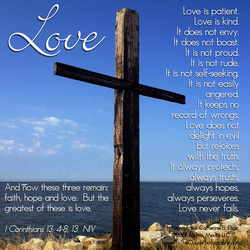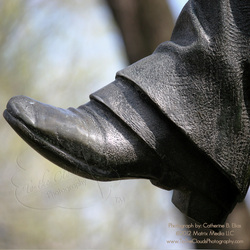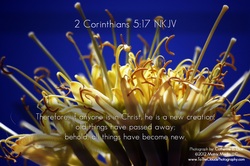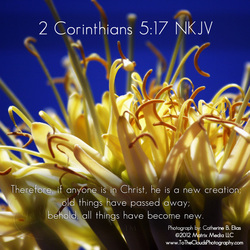... 22Then the angel showed me the river of the water of life, bright as crystal, flowing from the throne of God and of the Lamb 2through the middle of the street of the city. On either side of the river is the tree of life with its twelve kinds of fruit, producing its fruit each month; and the leaves of the tree are for the healing of the nations. 3Nothing accursed will be found there any more. But the throne of God and of the Lamb will be in it, and his servants will worship him; 4they will see his face, and his name will be on their foreheads. 5And there will be no more night; they need no light of lamp or sun, for the Lord God will be their light, and they will reign forever and ever.  Heroclitis, the philosopher of Ephesus (modern day Turkey) lived through the fall of Israel to the Assyrian empire. His thoughts helped form Western thinking. Without Heroclitis, there is no Socrates, there is no Plato. The idea that things change… that’s Heroclitis. It’s hard for us to imagine thinking before that understanding. We also can thank Heroclitis for the idea of the logos… that there is a first word, a channel, a force from which all other things come. The entire gospel of John is based on that premise. Another thing that Heroclitis said, “no one enters the same river twice, for even as you step into fresh waters, new waters are flowing upon you.” I began to think of Heroclitis when I read the end of Revelation… Did you hear it in the text? The sea has disappeared and in its place… a river. This new life is dynamic, not static… it’s not life at a beach house, it’s life on the banks of a river. The crowd has gathered around a moving river. The picture is of life in motion. God says, “I am making all things new.” Present tense and continuous. God is making… not God will make, not God made already… but God is in the process of continually making. Sounds like a river, doesn’t it? Something that’s in constant motion. Constantly new. Life in this new kingdom is dynamic, not static… it’s not life at a beach house, it’s life on the banks of a river. We embark on a course of life that constantly welcomes new waters. Is that what it means to be Easter people?
0 Comments
When he had gone out, Jesus said, ‘Now the Son of Man has been glorified, and God has been glorified in him. If God has been glorified in him, God will also glorify him in himself and will glorify him at once. Little children, I am with you only a little longer. You will look for me; and as I said to the Jews so now I say to you, “Where I am going, you cannot come.” I give you a new commandment, that you love one another. Just as I have loved you, you also should love one another. By this everyone will know that you are my disciples, if you have love for one another.’ I couldn't resist googling, "what are Christians known for?" and this video came up first... it's short. And it doesn't say anything you wouldn't already guess if you were playing a game show with the same question. But nonetheless, here it is.  They will know that you are my disciples when you love one another. I think that's true. You know what else I think is true. I know that I am a disciple of Jesus when I love another. Particularly when I find it difficult to love. A woman in my congregation was struggling with loving her parents and said, "I love strangers... why can't I find grace for my own parents?" My answer... "Oh come on... all of us have a problem finding grace for members of our own families. Strangers are easy." Interestingly, on the same day that I had this conversation about loving family members, another congregant asked me about humility. "Where does humility come from?" He said, "I don't know if I have it and I'm wondering where to look for it." I asked him if he experienced awe or inspiration or deep gratitude. He said, "Yes." I said, "perhaps humility is found in relationship to those things around us that inspire us. Or maybe humility is found in the space that is created between us and our inspiration or gratitude." Maybe humility is about perspective. Maybe love is about perspective. That same day - seriously... what a day!?! I learned that a colleague of mine was going to teach a short lesson to a group of cub scouts. The lesson? Reverence. We laughed out loud at the idea of teaching reverence to a 6 year old. But alas, she would give it her best. Reverence, Humility, Gratitude, Inspiration, Awe, Love  This passage from John comes at the end of the chapter where Jesus washes the disciples feet. What's the modern day equivalent of washing someone's feet at dinner time? I have to believe that it too has something to do with perspective or relationship. I have to believe this kind of intimate act includes reverence and humility, gratitude, inspiration, awe and love. What did Jesus see in each of his friends as he knelt beside them with basin and towel? What was his perspective? What lived in the space between Jesus and his friend's feet? Was it reverence for the Spirit that breathed life in each of their moments? Was it humility that they had followed him, a Palestinian Jew with flesh and blood and dangerous, some would even say seditious ideas? They had loved him. Was he humbled by their love? Was it sheer gratitude of having friends along this journey? Was he inspired by the gifts that they had, each of them different gifts from his? Was it awe? What defined the space between him and another during this intimate act? The writer of John defined it as love. And then later says that others will know that we too follow Jesus if we love. But how - how do we love like that? How do we love with such intimacy? I believe it's about finding that which lies between us. What is our perspective as we love, or attempt to love? Maybe if we work on the perspective, love will work its way through us. Now in Joppa there was a disciple whose name was Tabitha, which in Greek is Dorcas. She was devoted to good works and acts of charity. At that time she became ill and died. When they had washed her, they laid her in a room upstairs. Since Lydda was near Joppa, the disciples, who heard that Peter was there, sent two men to him with the request, ‘Please come to us without delay.’ So Peter got up and went with them; and when he arrived, they took him to the room upstairs. All the widows stood beside him, weeping and showing tunics and other clothing that Dorcas had made while she was with them. Peter put all of them outside, and then he knelt down and prayed. He turned to the body and said, ‘Tabitha, get up.’ Then she opened her eyes, and seeing Peter, she sat up. He gave her his hand and helped her up. Then calling the saints and widows, he showed her to be alive. This became known throughout Joppa, and many believed in the Lord. Meanwhile he stayed in Joppa for some time with a certain Simon, a tanner.  When Peter first arrives, it's your average pastoral care call. A friend dies and they call the head pastor, Peter. He arrives in haste. I'm sure he was greeted with solemn faces, many tears. There were hugs and loving touches for all who were grieving. The house appears full of mourners - widows who had received the love and compassion of a woman named Dorcas. Once Peter makes his way through the crowd, the widows begin telling stories. Isn't that what we do? We tell stories of our loved ones when they are gone. We remember together. And apparently remembering Dorcas meant remembering her craft. "The widows stood beside Peter, weeping and showing him tunics and other clothing that she made while she was with them." I imagine many were wearing those tunics and clothing. It seems a wonderful tribute to Dorcas - a living fashion show. The work of her hands walking around while stories are told of her love and compassion. It was the fashion show of her life. They were showing her off by showing off her handiwork.  But then Peter "put them outside" and, alone, entered the room where Dorcas was. The last time he had done something like this, he wasn't alone. He was with their friend Jesus and a couple others friends. They entered the room of a daughter who had died. Jesus told her to get up and she did. Peter imitated Jesus. He told her to get up. And she did. And then calling the saints and widows - Peter showed them Tabitha. Not the work of her hands but the work of God's hand, the work of the Spirit to resurrect, to give life, to re-create, to lift up. Peter showed them God's handiwork. Meanwhile Saul, still breathing threats and murder against the disciples of the Lord, went to the high priest 2and asked him for letters to the synagogues at Damascus, so that if he found any who belonged to the Way, men or women, he might bring them bound to Jerusalem. 3Now as he was going along and approaching Damascus, suddenly a light from heaven flashed around him. 4He fell to the ground and heard a voice saying to him, “Saul, Saul, why do you persecute me?” 5He asked, “Who are you, Lord?” The reply came, “I am Jesus, whom you are persecuting. 6But get up and enter the city, and you will be told what you are to do.” 7The men who were traveling with him stood speechless because they heard the voice but saw no one. 8Saul got up from the ground, and though his eyes were open, he could see nothing; so they led him by the hand and brought him into Damascus. 9For three days he was without sight, and neither ate nor drank. 10Now there was a disciple in Damascus named Ananias. The Lord said to him in a vision, “Ananias.” He answered, “Here I am, Lord.” 11The Lord said to him, “Get up and go to the street called Straight, and at the house of Judas look for a man of Tarsus named Saul. At this moment he is praying, 12and he has seen in a vision a man named Ananias come in and lay his hands on him so that he might regain his sight.” 13But Ananias answered, “Lord, I have heard from many about this man, how much evil he has done to your saints in Jerusalem; 14and here he has authority from the chief priests to bind all who invoke your name.” 15But the Lord said to him, “Go, for he is an instrument whom I have chosen to bring my name before Gentiles and kings and before the people of Israel; 16I myself will show him how much he must suffer for the sake of my name.” 17So Ananias went and entered the house. He laid his hands on Saul and said, “Brother Saul, the Lord Jesus, who appeared to you on your way here, has sent me so that you may regain your sight and be filled with the Holy Spirit.” 18And immediately something like scales fell from his eyes, and his sight was restored. Then he got up and was baptized, 19and after taking some food, he regained his strength. For several days he was with the disciples in Damascus, 20and immediately he began to proclaim Jesus in the synagogues, saying, “He is the Son of God.”  They heard the voice but saw no one. What a dramatic scene, right? Yes, we know this as Saul's story but the folks around him are on this roller coaster of a journey too. The men, the assistant persecutors, the friends, the colleagues of Saul also heard the voice. But they saw no one. Lightning or flashes of light, or something... what a show. Shocked to the ground, Saul begins to get up only to find that no only had they not seen anyone, he could no longer see anything. His companions would now have to lead him by the hand. Their fearless leader - now being led around like a child. What were these men thinking? They take him to the house of Judas. Who was he in the grand scheme of things? Was this a hospitality house of sorts? Was it a hotel? Was it a friend's home? And if a friend - was this also a persecutor of the church? What did this person say of Saul's blindness? When Saul wasn't in the room, what did they all talk about? After all, they had three days of this blindness. Three days to think about their life with a blind leader. Three days to get their resumes ready.  Then the story turns to Ananias. One of the faithful followers of the Way. He hears a voice too. He has no need to see someone. He knows the voice. Presumably, he has heard this voice before. In fact there's a familiarity in his reaction to the voice. He begins in conversation with it. He pushes back at the voice. "Lord, I've heard about this man..." The Lord says, "Go." Ananias goes. What was that scene like? What was the journey to Straight St. like? Did Ananias bring friends? It doesn't say so but that would seem odd too, right? I mean certainly he would've brought others to see about Saul. Certainly he would've brought at least one other friend who could have his back, help him out, give a witness. There's a full room at Judas' house. It's not just Saul's story. The story is about two worlds colliding because people listen for voices, hear voices and follow voices. The story isn't just about Saul and his new calling. It's about the new calling for his friends who had to lead their leader by the hand when needed. The story isn't just about Saul's blindness. It's about Ananias and the others having to see Saul as an instrument of God before it had happened. There's a full room at Judas' house. Even we are in that room somewhere. All Photos can be found at To the Clouds Photography.
19When it was evening on that day, the first day of the week, and the doors of the house where the disciples had met were locked for fear of the Jews, Jesus came and stood among them and said, “Peace be with you.” 20After he said this, he showed them his hands and his side. Then the disciples rejoiced when they saw the Lord. 21Jesus said to them again, “Peace be with you. As the Father has sent me, so I send you.” 22When he had said this, he breathed on them and said to them, “Receive the Holy Spirit. 23If you forgive the sins of any, they are forgiven them; if you retain the sins of any, they are retained.” 24But Thomas (who was called the Twin), one of the twelve, was not with them when Jesus came. 25So the other disciples told him, “We have seen the Lord.” But he said to them, “Unless I see the mark of the nails in his hands, and put my finger in the mark of the nails and my hand in his side, I will not believe.”  We were robbed last summer. One morning, I came downstairs and found that the screen door in the kitchen was wide open. I thought – that’s odd. I looked around, the tv was still there. It seemed like maybe I had left it open by accident. About 8 hours later, Pete asks, “Where’s the laptop?” I told him the story… I was in the house. We lock our doors now. I look at the neighbors differently now. What we have inside our homes is valuable – and it’s not just the stuff like tvs, laptops, and jewelry. Go back with me to that scene in that locked home. The friends and coworkers of Jesus were in a house together, with the door locked. There’s a knock, they check to see who it is. It’s Mary. The let her in, looking to the left and the right as they lock the door again. She tells them this story, “I was crying at the cemetery when two men asked me why I was crying. I thought to myself – are they kidding? But I tell them, my friend Jesus had died and I don’t know where his body is… and before I could finish, another man walked up to me, I thought, of course, he was the groundskeeper. He asked me why I was crying too… and now truthfully I’m thinking to myself, fellas, it’s a cemetery... people cry. I started to answer him with the same tale but he interrupted me, he called my name, he said “Mary,” and then I realized it was Jesus not the groundskeeper. I leapt up to hug him and then before I knew it he was gone… but he told me that I should tell y’all. Then the story jumps to that evening. They were all together, in a locked room. After all, what we have inside is valuable, not just the stuff like tvs, laptops and jewelry. The disciples have this growing story but they clearly doubted whether or not to let it out. And so in a locked room, they sat, talking, wondering, napping, and then Jesus himself appeared. It doesn’t say that he used the door. (So as an aside, the locked door doesn’t keep Jesus out, it just keeps them locked in.) And he showed them his hands and feet. And then he breathed on them and told them that they have the power to forgive. What was inside of them was rich and valuable and Jesus wanted them to it out. And then he disappeared again. And they remained behind locked doors. Because remember, what we have inside is valuable, not just stuff like tvs, laptops and jewelry. There was a knock at the door again. Startled a bit, they checked (motion) and it was Thomas. You can imagine… one of them says, “I’m not telling him that Jesus just came in… he’s gonna be so mad that we sent him out for pizza. Someone else tell him.” They open the door, look to the left and the right and then lock it up again. Someone tells Thomas and he says, “let’s just say, I doubt it.” He gets such a bad wrap for this… remember that he’s saying this to people who have all seen something amazing and empowering and they’re still behind locked doors. I think Thomas said something like, “you really think I’m going to believe you? You saw Jesus, you believe he’s not dead, then why are you all still here? I doubt it.” The story jumps… a week later. They’re still behind locked doors. And Jesus shows up, again no need to let him in, he’ll find his own way. He let’s Thomas have a good look at him. Why? What’s the point? What they have inside of them was valuable… open the doors. Go give life to others. Be life for others. I think Jesus was trying to make the case that Isaiah was making in our other text. God doesn’t do things the way you think; God surprises, God intrigues. God has different ways of functioning than the human mind typically conceives. Sometimes you wake up and find things different than you thought… go with it. Say Hallelujah and open the door. Does it seem crazy? Or sometimes simply that God has done it the wrong way? Maybe God doesn’t judge the same way as us. Maybe God does things harder than we wanted. Maybe God changes us into different people. Say Hallelujah and open the door. Your life and your story, your feet and your hands are valuable. Open the door. The Bible is filled with invitations to humans from God that read… embrace life over death. Life wins. What you have inside is valuable – don’t keep it locked up. Let it out. It will transform the world. And humans… we doubt it. |
Search this blog for a specific text or story:
I am grateful for
|

This work is licensed under a Creative Commons Attribution-NonCommercial-ShareAlike 3.0 Unported License.
